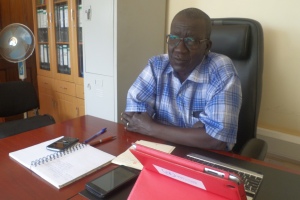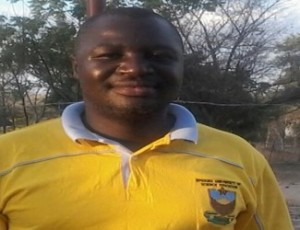Written By Chowoo WIlly

Dr. Ovuga speaking at the Faculty of Medicine at Gulu during an interview with Chowoo Willy
Emilio Ovuga, PhD, is Professor of Psychiatry and Mental Health of Gulu University. A medical practitioner and psychiatrist by profession, Dr. Ovuga holds a joint Doctor of Philosophy in Suicidology and Suicide Prevention, and Psychiatric Epidemiology of Karolinska Institutet and Makerere University.
Dr. Ovuga served as Dean of the Faculty of Medicine at Gulu University from February 2007 to June 2012. He is the founding Chairman of the Forum of Research and Ethics Chairpersons in Uganda (FRECU) and served in that capacity from 2009-2015.
Dr. Ovuga has held various positions of responsibility at Makerere University from 1989-2006. Prior to that Dr. Ovuga worked as Psychiatrist at Mathare Mental Hospital in Nairobi, Kenya (1981- 1982); as Provincial Psychiatrist at Kakamega Provincial Hospital in Western Kenya (1982-1984); and as Senior Psychiatrist in the Transkei Homeland of South Africa (1984-1989).
Dr. Ovuga is a researcher, medical practitioner and educator, administrator, mentor, and has conducted research in wide-ranging fields in health and social sciences related to population, health promotion and in peace building.
Dr. Ovuga, in the service of Makerere University, revitalized the Department of Psychiatry from near-collapse to a vibrant department, and his work led to the recognition of psychiatry as an important clinical discipline that became examinable in its own right for the award of the medical degree of Makerere University.
Dr. Ovuga’s negotiations with the Ugandan Ministry of Health led to the rapid scale up of the strengthening of the Department of Psychiatry, and the subsequent training of psychiatrists to PhD levels. Dr. Ovuga has developed curricula for training medical undergraduate students in basic psychiatry, graduate students in psychiatry at master’s level, and lay community members in lay peer counseling of people in crisis.
Dr. Ovuga currently trains, supervises and mentors doctoral and post-doctoral fellows in psychiatry and mental health for psychiatrists, psychologists and social workers. Dr. Ovuga believes in, and practices multidisciplinary and multi-professionalism in teaching and research so as to enhance a university’s relevance and responsiveness to the needs of communities.
As a Principal Investigator or Co-PI on 7 research grants that he attracted to Gulu University, Dr. Ovuga has promoted a sustainable research culture at Gulu University, which was established in Northern Uganda in 2002. As a strategic tool, Dr. Ovuga established a Grants Management Unit (GMU) at the Faculty of Medicine in 2009 to support young investigators at
Gulu University in the processes of developing, submitting grant applications, and subsequently managing grants.
Dr. Ovuga has been an instrumental member of the NIH-funded Ugandan MEPI-MESAU consortium in Uganda as well as a member of the Welcome Trust-funded THRiVE project consortium in East Africa. Dr. Ovuga actively advocated for the training and mentor-ship of undergraduate students in research as a strategy to build health research capacity in Uganda. In an effort to impart practical skills in students, Dr. Ovuga has developed guidelines and provided training opportunities for young investigators and students in research.
In his work with communities, Dr. Ovuga has empowered communities to take charge of, and responsibility for their social and health situations, and in improving their relations with government departments. A key example of this empowerment is Dr. Ovuga’s contribution to mental health promotion and suicide prevention using trained lay community counselors (Village
Helpers) in Adjumani district in the early 2000’s and Gulu district (ongoing) where suicide rates dropped by more than 75% within less than a year.
During the course of his teaching and research career, Dr. Ovuga contributed to the establishment of the African Program for Onchocerciasis Control (A.P.O.C.) as a member of the WHO/TDR research team on the psycho-social importance of, and treatment of onchocercal skin disease in Sub Saharan Africa (SSA). Shortly thereafter Dr. Ovuga contributed to the development of the concept of community-directed distribution of Ivermectin, the drug used in the control of onchocerciasis in endemic areas of SSA, for the WHO through a pilot study in Uganda. As a peace builder, Dr. Ovuga also made a humble contribution, as a social scientist on the Northern Uganda Peace Initiative (NUPI), to the initiation of peace talks between the Government of Uganda and the terrorist rebel group, the Lord’s Resistance Army of Joseph Kony, which eventually ended the 20-year-long rebel insurgency in northern Uganda in 2006.
Overall, Dr. Ovuga’s research work and philosophy has led to the enhancement of community empowerment to enable them assume responsibility for their welfare in collaboration with professionals in all fields of social services.
Dr. Ovuga believes that this can best be achieved through creating “expertise” among lay non-professionals including community members that might have no formal classroom education. Dr. Ovuga achieves this goal by using and integrating his professional background training knowledge and skills into traditional knowledge attitudes beliefs systems, and cultural practice systems of rural communities to address local health problems without antagonizing traditional views and perceptions; in doing so Dr. Ovuga’s approach has so far not jeopardized the success of health intervention outcomes in communities where this need has been expressed.
Dr. Ovuga is a family man, married to Elizabeth Nandaula, and has raised nine children with six grand children so far. His love for his children has earned the perception that his “children are daddy’s children”. His relationship with his children earned his the Xosa name, Mzwandile, while his love for peaceful coexistence among people of different social backgrounds earned him the additional Xosa name, Mxolisi.
Raised as an only child in a poor remote corner of northwestern region of Uganda in Adjumani district, Dr. Ovuga actively supported his peasant parents in cultivating their land, fishing and selling produce to raise school fees for his early education. Dr. Ovuga loves the green environment and continues gardening as a hobby in his backyard.
As a researcher, Dr. Ovuga has supported and mentored one of his sons, Dr. Alexander Bombom to pursue research in agricultural genetics and biotechnology with promising results. Dr. Ovuga is humble, polite and has been described as honest and “soft-spoken” by his colleagues and students. Dr. Ovuga loves country music, jazz, and Lingala songs of the sixties to eighties.

